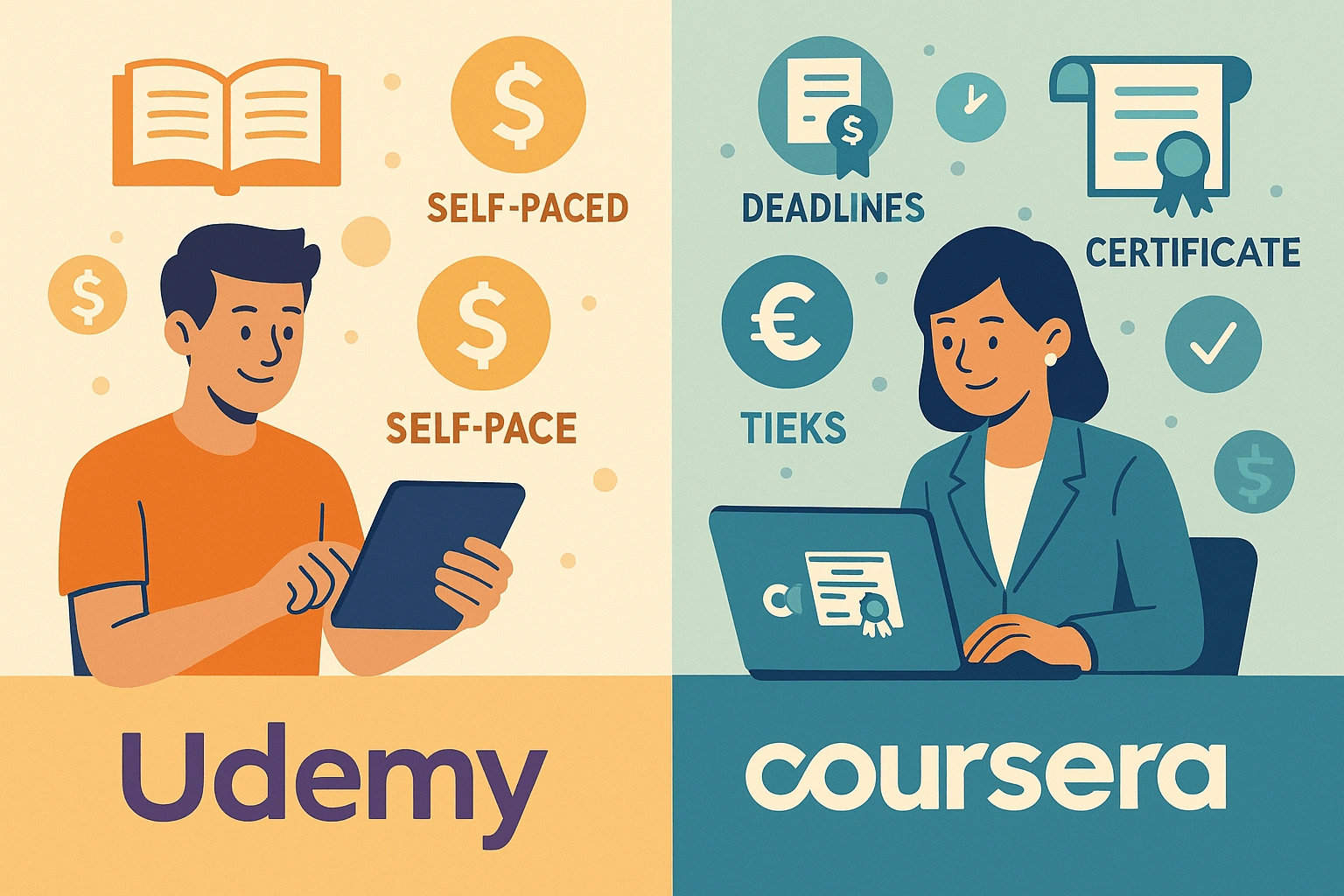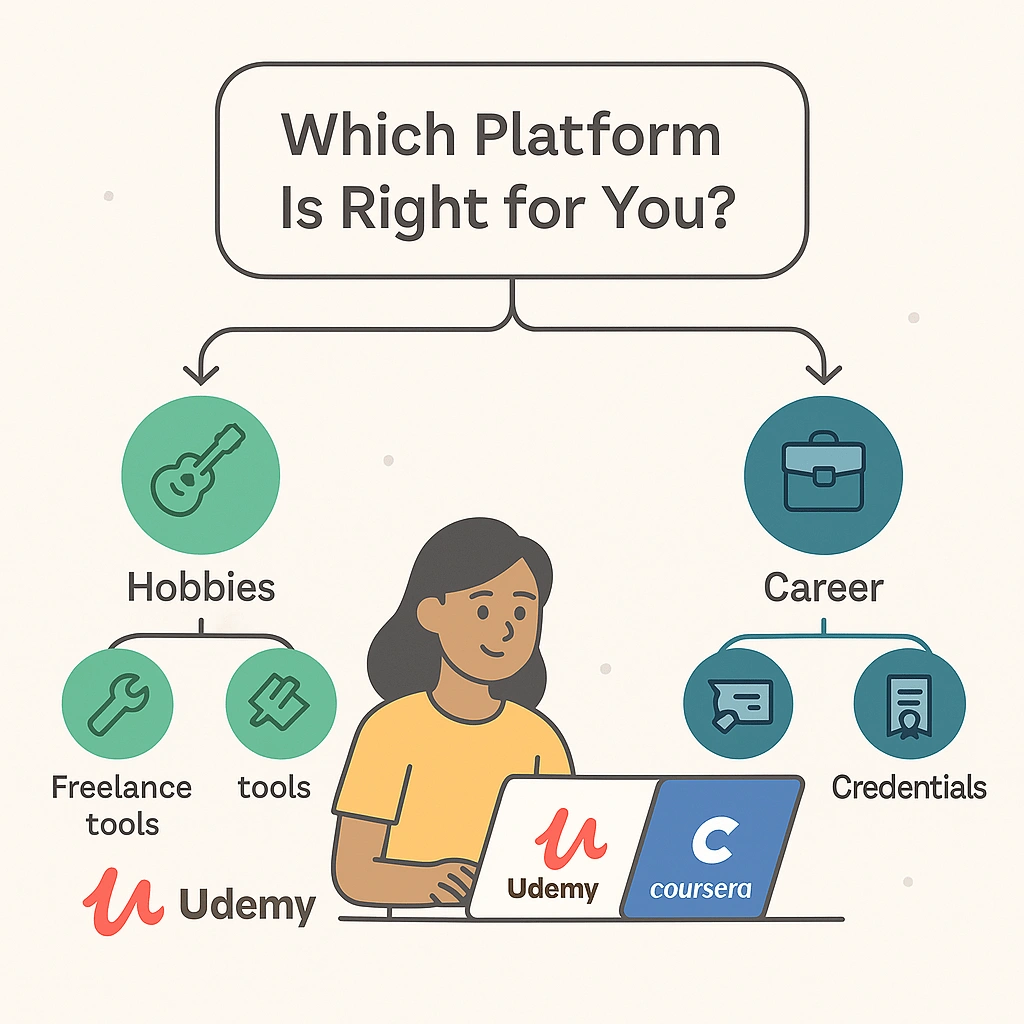Looking to take an online course but can’t decide between Udemy and Coursera? You’re not alone. These two platforms dominate the online learning space—but they serve different purposes, price points, and learners. Whether you want a quick skill boost or a university-backed certificate, understanding how they compare can save you time and money.

In this detailed comparison, we’ll break down their pricing models, course formats, instructor quality, certificates, and career value—so you can confidently choose the platform that matches your learning goals.
Overview: What Are Udemy and Coursera?
Udemy is a massive open course marketplace with over 210,000 courses taught by independent instructors. It covers a wide range of topics including business, technology, personal development, marketing, photography, design, and more. Courses are typically video-based, self-paced, and low-cost.
Coursera, on the other hand, is an academic learning platform that partners with top universities and companies (like Stanford, Yale, Google, and Meta) to offer professional certificates, degrees, and specializations. Courses often follow a structured syllabus with peer assessments and real-world projects.
👉 If you’re after budget-friendly, fast learning, Udemy is ideal. If you need recognized certifications or university-level content, Coursera is the better fit.
Key Differences: Pricing, Credentials, Structure & Support

💵 Pricing & Access
- Udemy: One-time payment per course. Regular promotions bring most prices down to $10–$25. Lifetime access to purchased courses.
- Coursera: Free to audit most courses. Paid options range from $39–$79/month for certificate programs. Full degrees start at ~$9,000.
Value tip: Use Coursera’s audit feature for free learning without certificates.
🎓 Certificates & Career Recognition
- Udemy: Non-accredited “Certificate of Completion” – good for self-improvement or freelance portfolios.
- Coursera: Offers verified certificates from institutions like Duke, Yale, and Google—highly regarded by recruiters and on LinkedIn profiles.
🧠 Course Quality & Instructor Expertise
- Udemy: Quality varies widely. Some instructors are excellent, others less so. Always check student reviews and previews.
- Coursera: Content is curated and reviewed by academic institutions. Courses follow university-level rigor.
⏱️ Learning Style & Structure
- Udemy: Learn on-demand with bite-sized videos. Great for casual learners and practical tutorials.
- Coursera: Often includes assessments, projects, peer reviews, and reading material. Best for structured learners who want depth.
👥 Community & Support
- Udemy: Limited interaction. Some Q&A per course.
- Coursera: Active peer discussion forums. Instructor or mentor support in some programs.
Which Platform Is Right for You?

Choose Udemy if you:
- Want to quickly learn a practical skill like Excel, Photoshop, web development, or productivity tools.
- Prefer short, focused, low-cost courses with no deadlines.
- Are exploring hobbies or upskilling for freelance or side projects.
- Value lifetime access to course material for review anytime.
💡 Popular Udemy course topics: Python basics, Excel for business, time management, public speaking, Canva design.
📌 Explore: Best Python Courses on Udemy
Choose Coursera if you:
- Want a career certificate or accredited credential to put on your resume.
- Are pursuing a career change, promotion, or want to stand out in a competitive job market.
- Prefer university-grade structure and access to academic material.
- Need proof of learning from top brands like Google, Meta, IBM, Stanford, and others.
💡 Top Coursera options: Google Project Management, Meta Front-End Developer Certificate, Yale’s Financial Markets, University of Illinois MBA.
Understand the core differences between these two e-learning giants inside our Best Online Learning Platforms Guide (2025), and don’t miss our companion article Skillshare vs LinkedIn Learning Comparison to complete your research.
Feature Breakdown: Udemy vs Coursera
| Feature | Udemy | Coursera |
|---|---|---|
| Price | $10–$30 per course (frequent sales) | Free to audit; $39–$79/mo for certificates |
| Access | Lifetime access | Access tied to subscription or deadline |
| Certificates | Non-accredited | Verified by universities/companies |
| Course Style | Short videos, self-paced | Structured content with projects & deadlines |
| Best For | Skill sharpening, hobby learning | Career credentials, academic knowledge |
| Support | Q&A with instructor | Discussion forums, sometimes mentor support |
| Mobile App | Yes (offline access) | Yes |
FAQs: Udemy vs Coursera
For formal learning and certificates, yes. Coursera’s partnerships make it ideal for resumes and job seekers. But Udemy is unbeatable for fast, affordable upskilling.
They’re not accredited, but show initiative. Good for freelancing, portfolio building, and internal training—not for regulated professions.
Yes, most courses offer a free audit option (no certificate). Some also include a 7-day free trial on paid plans.
Many learners use both: Udemy for quick wins and Coursera for career development.
Final Thoughts: Which Should You Choose?

Choose Udemy if you want:
- Affordable, one-time payment courses
- Flexible learning with no deadlines
- Hands-on, skill-focused content
Choose Coursera if you need:
- Recognized certification or a degree
- Structured, academic content
- Credentials from top institutions






